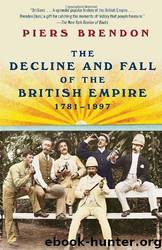The Decline and Fall of the British Empire, 1781-1997 by Piers Brendon

Author:Piers Brendon [Brendon, Piers]
Language: eng
Format: epub, mobi
Tags: History, General, European History, Political Science, Europe, Great Britain, World, Great Britain - Colonies - History, Commonwealth countries - History, Commonwealth (Organization) - History, Commonwealth countries, Ireland, Imperialism - History, Great Britain - Civilization, Imperialism
ISBN: 9780307388414
Publisher: Random House, Inc.
Published: 2008-10-27T10:00:00+00:00
This verdict was heard in other parts of Africa painted red on the map. Settler colonies in particular seemed bent on following the Boer example: one Cewa chief complained that Southern Rhodesians did not look on black people as humans, “they just treat them as dogs.”107 In his impassioned account How Britain Rules Africa (1936), George Padmore, a Trinidadian Marxist, said its colonies were a “breeding-ground for the type of fascist mentality which is being let loose in Europe to-day.”108 Yet Britain’s record in Africa was better than that of other European states and on the whole, once in place, its yoke was easy. It lacked the manpower, the resources and the will to govern its tropical dependencies by main force, ruling through native collaborators and relying on white prestige. Indeed, one colonial judge, remarking on how a single District Officer with half a dozen askaris might be in charge of 100,000 Africans, said that Britain’s “whole position rests on bluff.”109 In settler colonies, limits were imposed on the exploitation and coercion of blacks by the poverty and paucity of whites, to say nothing of interference from London. True, the British squeezed where they could, as in the copper belt of Northern Rhodesia. There, between 1930 and 1940, they took £2.4 million in taxes and gave only £136,000 in development grants. They thus starved the colonial government of funds for roads, agriculture, housing and essential social services, which remained “very backward.”110 Development was also limited elsewhere, particularly when times were hard. Between the wars West Africa, though politically quite advanced, was economically stagnant. Basutoland was hardly touched by government. Such tiny sums were spent on Nyasaland that workers emigrated to the more racially hostile environment of Rhodesia and South Africa. A Governor of Tanganyika said that his territory was kept “in mothballs.”111 A Governor of Nigeria said, “The great merit of British rule is that there is so little of it.”112 Only in the Union of South Africa did the European community have the numbers, the wealth and the independence to impose thoroughly repressive policies based on colour. It duly laid the foundations of the apartheid system, confining the black two-thirds of the population to 13 per cent of the land, discriminating against Africans in the workplace, depriving them of votes and passing other racist laws. This prompted the creation of the African National Congress, with its haunting anthem, adopted in 1925, “Nkosi sikeleli Afrika”—“God Bless Africa.”
Across the continent, though, other such bodies sprouted as opposition to imperial overlordship grew. The process was gradual, intermittent and by no means preordained. There was nothing inevitable, either, about progress towards the ultimate goal of self-government. Trusteeship, in any case a slippery concept, was supposed to become partnership with native peoples, which would eventually lead to their independence. However, as a liberal settler said, “Those of us who live in Central Africa know very well that partnership between black and white…is at best a pious hope, at worst a disingenuous myth propagated for political purposes.
Download
The Decline and Fall of the British Empire, 1781-1997 by Piers Brendon.mobi
This site does not store any files on its server. We only index and link to content provided by other sites. Please contact the content providers to delete copyright contents if any and email us, we'll remove relevant links or contents immediately.
| Africa | Asia |
| Canadian | Europe |
| Holocaust | Latin America |
| Middle East | United States |
Fanny Burney by Claire Harman(25789)
Empire of the Sikhs by Patwant Singh(22176)
Out of India by Michael Foss(16313)
Leonardo da Vinci by Walter Isaacson(11913)
Small Great Things by Jodi Picoult(6104)
The Six Wives Of Henry VIII (WOMEN IN HISTORY) by Fraser Antonia(4797)
The Wind in My Hair by Masih Alinejad(4427)
The Lonely City by Olivia Laing(4122)
The Crown by Robert Lacey(4111)
A Higher Loyalty: Truth, Lies, and Leadership by James Comey(4038)
The Iron Duke by The Iron Duke(3642)
Millionaire: The Philanderer, Gambler, and Duelist Who Invented Modern Finance by Janet Gleeson(3574)
Sticky Fingers by Joe Hagan(3456)
Alive: The Story of the Andes Survivors by Piers Paul Read(3317)
Papillon (English) by Henri Charrière(3276)
Joan of Arc by Mary Gordon(3263)
Stalin by Stephen Kotkin(3089)
Aleister Crowley: The Biography by Tobias Churton(3024)
Ants Among Elephants by Sujatha Gidla(2927)
